While the economy began the year with robust momentum, Wednesday brought another unexpected jolt to the markets, signaling a potential shift in economic conditions.
May witnessed a further deceleration of economic activity, and now, inflation has accelerated at a rate exceeding prior forecasts. Projections indicate that inflation will remain above the Bank of England’s target until autumn.
For consumers, who have endured years of escalating prices, particularly a recent surge in food costs, the latest inflation figures serve not as a surprise, but as a confirmation of the economic challenges they confront daily.
Additionally, and of equal importance to some observers, the resurgence of inflation complicates the Bank of England’s anticipated interest rate cuts.
Investors had largely priced in a rate reduction in August, lowering rates from the current 4.25%.
A renewed sense of caution is now palpable within financial circles.
Economist Andrew Sentance, a former rate setter at the Bank of England, has gone so far as to suggest that lowering interest rates next month would be “irresponsible.”
Expectations persist that the August rate cut, as well as a subsequent reduction later in the year, will proceed as planned.
However, the Bank of England will face scrutiny as it explains its rationale for overlooking the current inflationary uptick, focusing instead on the anticipated return to the 2% target next year.
This situation revives long-standing concerns about whether the UK is inherently more susceptible to inflation than other economies, potentially due to the practice of passing on rising wage and tax costs to consumers in the form of higher prices.
The weakening labor market also factors into these deliberations. The latest employment figures are scheduled for release on Thursday.
If, as predicted, the data reveal a continued decline in job vacancies, this would bolster the argument for implementing a rate cut. Bloomberg forecasts an unemployment rate of 4.9%, an increase from the 4.6% reported the previous month.
It is essential to maintain perspective when interpreting these figures.
While other major economies have not experienced a similar resurgence in inflation—the eurozone’s latest inflation rate stands at just 2%—inflation remains well below the peaks observed during the energy crisis and is projected to decline as energy prices moderate in the autumn.
Economic growth is undeniably slowing, but the nation is not currently in a recession, and recent activity figures suggest a recovery in specific sectors.
Chancellor urges the financial industry to reshape the narrative surrounding consumer investment to promote economic expansion.
Andrew Bailey tells the Times he believes “the path is downward” on interest rates.
Sustained borrowing is not a viable long-term solution to escalating everyday spending demands.
The economy contracted in May for the second month in a row, adding to pressure on the chancellor.
Chancellor Rachel Reeves has shelved plans to alter Isa rules, but what are they and how do they work?

